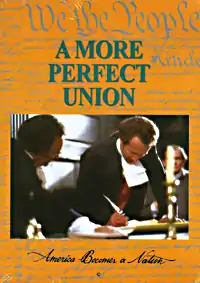A More Perfect Union (film)
A More Perfect Union: America Becomes a Nation is a 1989 American feature film dramatizing the events of the 1787 Constitutional Convention. The film was produced by Brigham Young University to commemorate the 200th anniversary of the drafting of the United States Constitution, and many professors from BYU's School of Fine Arts and Communications were involved in its production either as actors or in other capacities. After its release, the film was officially recognized by the Commission on the Bicentennial of the United States Constitution as "of exceptional merit".[1]
| A More Perfect Union | |
|---|---|
 DVD and video cover | |
| Directed by | Peter N. Johnson |
| Screenplay by | Tim Slover |
| Produced by | Peter N. Johnson Nicholas J. Gasdik |
| Edited by | Peter G. Czerny |
| Music by | Kurt Bestor |
Production company | |
Release date | 1989 |
Running time | 112 minutes |
| Country | United States |
| Language | English |
Plot summary
The film depicts events surrounding creation of the United States Constitution, and is focused mainly on James Madison, who wrote most of that document and took extensive notes during the convention's discussions and proceedings.[2]
The period immediately following the American Revolutionary War was marked by intense political unrest, owing to huge debts, the interruption of trade and business, shortages of labor, and personal turmoils, all created by the War. It soon became evident that the Articles of Confederation were insufficient to address the country's needs. A movement soon emerged to upgrade or replace the Articles, and Madison was foremost in the movement. However, he needed the support of George Washington, and needed to show that a new government would be sufficient to address such challenges as Shays' Rebellion and the growing trade problems between the independent States.
Madison was strongly opposed by those who feared a strong central government, people known either as States Rights Advocates or as Anti-Federalists, such as Roger Sherman and John Dickinson. Madison was in favor of a bicameral congress, but envisioned both houses being elected according to proportional representation. In this he was opposed by the States Rights Advocates, and he eventually accepted the compromises necessary to address their concerns. The film highlights the basis for these compromises.
The film also depicts the convention delegates' debate about the slave trade
Cast
- Craig Wasson ... James Madison
- Michael McGuire ... George Washington
- Fredd Wayne ... Benjamin Franklin
- Morgan White ... George Mason
- Douglas Seale ... Lord Carmarthen
- Bruce Newbold ... Edmund Randolph
- James Walsh ... James Wilson (as James Walch)
- Ivan Crosland ... John Adams
- H.E.D. Redford ... Roger Sherman
- Jesse Bennett ... John Dickinson
- Roderick Cook ... Nathaniel Gorham
- Derryl Yeager ... Alexander Hamilton
- James Arrington ... Gouverneur Morris
- Steve Anderson ... Elbridge Gerry
- Dick Cheatham ... Williams
- Richard Dutcher ... Charles Pinckney
- Bruce Eaton ... Richard Henry Lee
- Vince O'Neil ... John Langdon
- Marvin Payne ... Rufus King
- Scott Wilkinson ... Thomas Jefferson
- Lael Woodbury ... George Wythe
- Scott Bronson ... Robert Morris
- Fred Laycock ... Caleb Strong
- Wayne Brennan ... Oliver Ellsworth
- Dave Blackwell ... Robert Livingston
Production notes
The movie was filmed on location at Independence Hall in Philadelphia, in Williamsburg, Virginia, and at other historical sites. Much of the film is shot from the viewpoint of James Madison, with the script being based primarily on his writings. These include the copious minutes he took during the Constitutional Convention, which were published as Notes of Debates in the Federal Convention of 1787.
References
- "A More Perfect Union - Education Package". National Center for Constitutional Studies. Archived from the original on 12 October 2013. Retrieved 11 October 2013.
- "A More Perfect Union: America Becomes a Nation". IMDb. Retrieved 11 October 2013.
